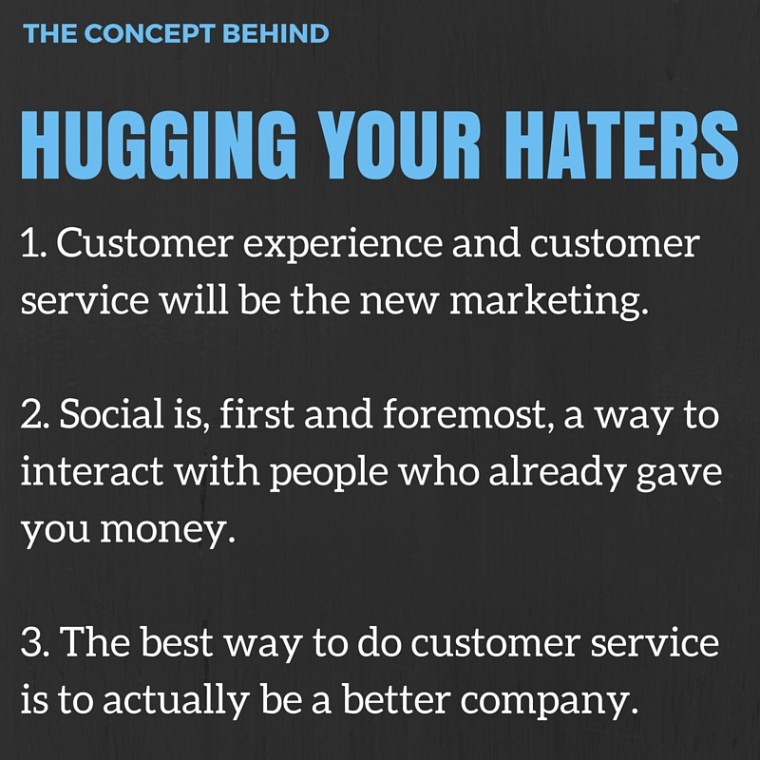Podcast: Download
Subscribe: Apple Podcast Google Podcasts Spotify
Visit our Marketing Nerds archive to listen to other Marketing Nerds podcasts!
In this week’s episode of the Marketing Nerds podcast, Jay Baer, who is a world-renowned speaker and author of the best-selling book Youtility, joins us to talk about a very important topic around embracing customer complaints through social media, which is also the topic of his next book Hug Your Haters, which is coming out on March 1, 2016.
During our conversation, we discussed the progress companies have made in adapting to social media, the importance of customer service through social, how to strategize and prepare for engaging upset customers, and even the tough discussion about whether companies should have social accounts at all if they are unable to monitor and manage them.

Here are a few of transcribed excerpts from our discussion, but make sure to listen to the Podcast to hear everything:
Customer service through social media as being critical for every business
For a long time we thought about social media as you said early on, as a way to sell stuff, and it still is in some cases, but I think what we have discovered over time as business people is that social is, first and foremost, a way to interact with people who have already given you money.
Think about who you follow on Twitter, who you follow on Facebook from a company standpoint. It’s typically the companies that you already patronize.
The research shows that approximately three-quarters of everybody that follows a business on Facebook is a current or former customer of that company, and of course they are. Right?
I mean you don’t go to Facebook and say “Hey, I’ve never heard of this company. I have no idea what they sell. I am going to like them and get them into my feed even though I have no idea what they do.”
Typically, social media interaction is a trailing indicator of a business relationship. Not a leading indicator of a business relationship.
So, in my new book Hug Your Haters we did tons and tons of research. We researched thousands of Americans to figure our who and where and why and how they complain, and what we found is the pendulum is shifting very, very quickly, which should not come as a surprise to anybody listening here.
The pendulum is shifting very, very quickly from people using the telephone and email to complain to people using social media and discussion boards and review sites to complain. Partially because it is easier.
I mean if everyone is carrying a smartphone, it’s easier to complain on Twitter than it is to wait on hold, and because companies in many cases, give you better service if you actually complain in public as opposed to in private.
So, companies in most cases are just not set up yet to handle customer service in a way that is online first. It’s sort of an adjunct in most businesses today.
Is this an approach that is proactive or reactive?
Both proactive and comprehensive. So, the two kind of key lines in the book are that haters are not your problem. Ignoring them is. The hug your haters recipe is to answer every complaint, in every channel, every time.
Every complaint … Every channel … Every time …
Now that almost never happens today, but why doesn’t it?
If someone called you, you would call them back. It’s unthinkable that somebody would call a business, leave a voice mail in a business context, and you would never call them back, but we routinely ignore what is equivalent to a phone call in Twitter, in Facebook, and in a number of other places.
Getting companies to embrace seeking out customers with complaints
That’s literally why I wrote the book. To make sure people understand that every complaint is a gift. See, haters are not what kills your business.
What kills your business is the sort of meh in the middle, the people who are dissatisfied, but never complain. The research shows that only five percent of dissatisfied customers ever take the time to complain in public.
So that means for every complaint that you ever find on Twitter … for every complaint on Yelp … or Trip Advisor, or Reddit, or Instagram, or anywhere else, there’s a lot of other people who have had a similar circumstance, but just never took the time.
So the public haters are sort of the unelected representatives of your overall customer base.
So it is incredibly important to not only seek those people out, but to listen to what they are saying because the best way to do customer service, is to be a better company, but if you don’t actually know what is wrong with your business how are you going to do that?
Should companies have a response plan in place, with approved responses to speed things up?
Yes. For common questions, you should absolutely have an in your pocket appropriate response.
Now, you don’t want to copy and paste per say, because that looks kind of cheesy, but you should at least be able to know how to address common questions.
So, there are two important points here.
One, people who complain in public, what I call in the book the “on stage haters.” On stage haters in most cases actually aren’t looking for an answer. They are looking for an audience.
When people complain on Facebook, when they complain on Twitter, when they complain on Instagram or Google Plus or Linked In or Yelp or a forum, only about half the time, actually slightly less than half the time, do they actually expect the business to respond at all.
Usually, they are just complaining.
However, when they do expect a response, they expect that response about half the time, within an hour or less.
So, the good news is that half the people don’t expect to hear back from you. The bad news is that those that do expect to hear back from you, expect to hear back from you quite quickly.
So should companies avoid making accounts they cannot maintain and monitor?
Well from a marketing standpoint, from a proactive social media standpoint, having a ghost town account probably doesn’t hurt you, but from a reactive social customer service standpoint it does.
If you have an account people may logically assume they can get help on that account, and if you are not managing, if you’re not staffing it, if you’re not paying attention there, you are setting up an expectation for customers that is not true.
That could be a challenge. Now that being said, that is platform specific.
We don’t see in the research a lot of people complaining on Instagram, on Google Plus, or on LinkedIn.
The overwhelming majority of social media complaints and social media customer service outreach today is on Facebook and Twitter, and actually in some parts of the world also WhatsApp and WeChat.
So if you had, for example, a widowed Google Plus account or a widowed Instagram account that wouldn’t bother me too much from a customer service standpoint today.
Two years from now I might have a different answer.
What about when companies reach out to unhappy customers of competitors?
I have seen it mostly with mobile phone guys. Where somebody will complain about AT&T or Verizon and two seconds later T-Mobile will be like “Hey bro we have you covered. We’re going to pay your cancellation fee. It’s going to be awesome. It’s nothing but daisies and gravy over here.”
That’s a strategic and ongoing thing that they do, and many other brands do it as well.
I think that is a little bit distasteful.
I feel like you would be better off, instead of trying to reach out to that person in two seconds, try to reach out to that person with something useful, with utility, and do it with enough distance that it doesn’t feel quite so obvious.
It just feels a little cheesy.
Now certainly it can be effective. I totally get that, but if I was going to cancel a brand and a program like that I would say, “Come up with five things of actual value.” Here’s a great infographic. Here’s a really interesting e-book. Here’s some other information you might like, and then set it up where if somebody complains about a competitor you answer back in a very kind of casual way a day later, not five seconds later.
Just because it is so obvious at that point what you are doing, but if a little time has passed, your like, “Hey, you know I saw you had a problem. You might like to see this. It might be helpful to you.”
That is the fundamental problem of marketing. We believe we have to sell people, and if you do it right they will sell themselves.
They are not stupid. I mean you don’t have to lead people to water and then hold their head under water. You don’t have to waterboard your customers.
Just line up things for them that they find valuable, and they will figure out how to give you money.

To listen to this Marketing Nerds podcast with Jay Baer and Brent Csutoras:
- Download and listen to the full episode at the bottom of this post
- Subscribe via iTunes
- Sign up on IFTTT to receive an email whenever the Marketing Nerds podcast RSS feed has a new episode
- Listen on Stitcher
Think you have what it takes to be a Marketing Nerd? If so, message Kelsey Jones on Twitter, or email her at kelsey [at] searchenginejournal.com.
Visit our Marketing Nerds archive to listen to other Marketing Nerds podcasts!
Image Credits
Featured Image: Image by Paulo Bobita
In-post Photo #1: Jay Baer Pressroom
In-post Photo #2: Image by Search Engine Journal





